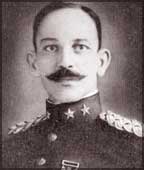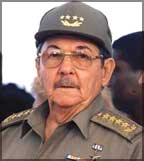Internationalism of the Cuban Revolution
On January 1 falls the 51st anniversary of the
Cuban revolution. This article written in commemoration of that event
gives the secret how a small country such as Cuba could withstand five
decades of hostility and aggression from its giant neighbour, the United
States and build an independent country where social justice reigns.
Jayatilleke DE SILVA
“Humanity is my homeland”
- Jose Marti
One wonders how a small nation, just 90 miles (a distance less than
that from Colombo to Matara) from the world’s only superpower could
survive for over five decades despite the hostility of that superpower
and the criminal blockade imposed by it.
The answer lies in the policy of solidarity and proletarian
internationalism revolutionary Cuba practised from the time of its
inception. As Che Guevara said for the Cubans proletarian
internationalism is both a duty and a necessity.
|

Jose Marti |
 | |
Cuba President Raul Castro |
The triumph of the revolution saw an avalanche of support throughout
the world. People all over the world, including those of far away
countries such as Sri Lanka, wished the new regime success and saw in it
the fulfilment of dreams similar to theirs.
Following the words of the Apostle “The world is my home”, Cubans
have fulfilled many internationalist missions, especially in the
developing world. On September 8, 2000 Fidel told residents of Harlem,
New York “half a million of our compatriots have carried out
internationalist missions in numerous countries in different parts of
the world, especially in Africa. They have been medical doctors,
teachers, technicians, construction workers, soldiers and others.”
Over 25,000 Cuban health workers including doctors have served
voluntarily in 93 countries including Sri Lanka. After the destructive
tsunami that hit our shores in December 2004 a contingent of health
workers came to Sri Lanka with a load of medicines and other medical
requirements.
An illustrious example of the Cuban internationalism was given by
Cuban health personnel who performed an arduous mission in the
mountainous region of Pakistan amidst a severe winter where a severe
earthquake left thousands homeless few years ago. In a matter of weeks
they treated more than 300,000 patients.
Cuba has formed a special brigade named after Henry Reeve to
undertake urgent disaster relief missions anywhere in the world. Henry
Reeve was a US national who fought in Cuba’s War of Independence. Formed
at the time of the Katrina hurricane which devastated the Gulf region in
the United States medical volunteers were ready to leave for emergency
operations in that region. However, due to political reasons the United
States did not respond favourably to the Cuban offer.
Special mention must be made of the Miracle Mission under which
thousands of Venezuelans were flown to Cuba for delicate eye surgeries.
The Mission still continues. Besides the Miracle Mission, a large number
of Cuban doctors serve in Venezuela. Taking part in a project called the
‘Barrio Adentro Mission’ they work in remote and poor neighbourhoods
where local doctors refuse to serve.
|

Che Guevara and Fidel Castro. Courtesy: Google |
Cuba has opened the Latin American School of Medicine to train
doctors for Third World countries. During the next ten years it is
expected to train 100,000 doctors from other countries free of charge.
In the United States such a project would cost $ 25 billion.
Cuba also has established medical colleges in African countries where
Cuban medical specialists train local doctors.
In the field of education Cuba has developed a low cost program,
“Yes, I can” to teach people how to read and write using radio and
television. It was first implemented in Haiti and later in New Zealand,
Nicaragua, Mozambique, Venezuela, Guinea Bissau, Mexico, Guatemala,
Belize, Argentina, Paraguay, Ecuador, Bolivia, Honduras, Peru, Brazil
and Nigeria. UNESCO termed the program a success, which among its main
achievements has taught one million 300 thousand Venezuelans, 109
Haitians, 6,000 Mexicans and some 4,000 Nicaraguans and Argentineans to
read and write.
Cuba has also provided scholarships to Cuban Universities for Third
World students free of charge. 47,000 foreign students from 125 nations
graduated from Cuban educational centres from 1961 to 2005. Today, Cuba
has become the nation with the largest number of foreign students per
capita. Unlike other countries one of the fundamental conditions for
granting scholarships to foreign students is their commitment to return
to their country of origin once their studies are concluded. Cuba has no
need to drain professionals from other countries.
In 1973, a group of 40 Spanish langauge professors travelled to
Equatorial Guinea to teach lessons there, marking the beginning of
Cuba’s cooperation with another people in the field of education. To
date, more than 22 thousand Cuban teachers have carried out similar
tasks in some 20 nations in Africa, Asia, Latin America and the
Caribbean.
One of the noblest international missions undertaken by Cuba was the
provision of military assistance to the Angolan people to win their
national liberation. Without the participation of the Cuban Army it
would have been difficult for the Angolans to withstand the concerted
onslaught of South African and Zaire Forces in 1975 that wanted to
prevent Angola wining freedom. Once again in 1987 when South African and
United States Forces attacked the Angolan Army advancing on the last
stronghold of counter-revolutionary Savimbi, Cuban Army came to the
assistance of Angola at its request. At that time there were 55,000
Cuban troops in Angola.
These solidarity actions prevented the isolation of revolutionary
Cuba and foiled the attempts of US imperialism. On the other hand,
Cuba’s prestige in the community of nations has grown over the years.
For example, in November 2005, 182 nations supported a resolution
calling upon the United States to lift the blockade of Cuba. Only four
countries including the United States and Israel opposed the resolution.
What added to the prestige of Cuba in the international arena was its
consistent policy. Granma, the official organ of the Communist Party of
Cuba stated it clearly in its editorial on October 27, 2001: “We Cubans
have the privilege of having never changed our stripes, of never
betraying or selling out a person, a country, a cause, a just word, not
for all the gold, well-being or convenience in the world. We Cuban
revolutionaries do not belong to that moral breed.”
Cuba did not waver even when the United States declared war on all
nations in the aftermath of the 9/11 tragedy in the United States in
2001. Replying to President Bush’s message “Every nation in every region
now has a decision to make. Either you are with us or you are with the
terrorists”, Fidel declared that Cuba is opposed to terrorism, and
opposed to war, the “lengthy and unparalleled war in history” which
President Bush threatened to unleash.
Hours after the war on Terror began with the invasion of Afghanistan,
Granma, the official organ of the Cuban Communist Party said in its
Editorial on October 8, 2001: “This is not a war against terrorism... It
is a war in favour of terrorism, since the military operations will make
it more complicated and difficult to eradicate terrorism. War is like
pouring oil on flames”. Since then the United States invaded Iraq and we
witness the unprecedented resurgence of terrorism there.
(The writer is President, Sri Lanka National Committee for
Solidarity with Cuba) |



